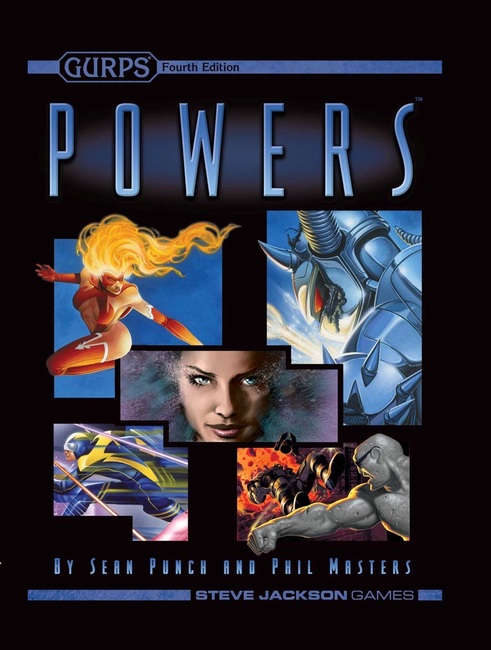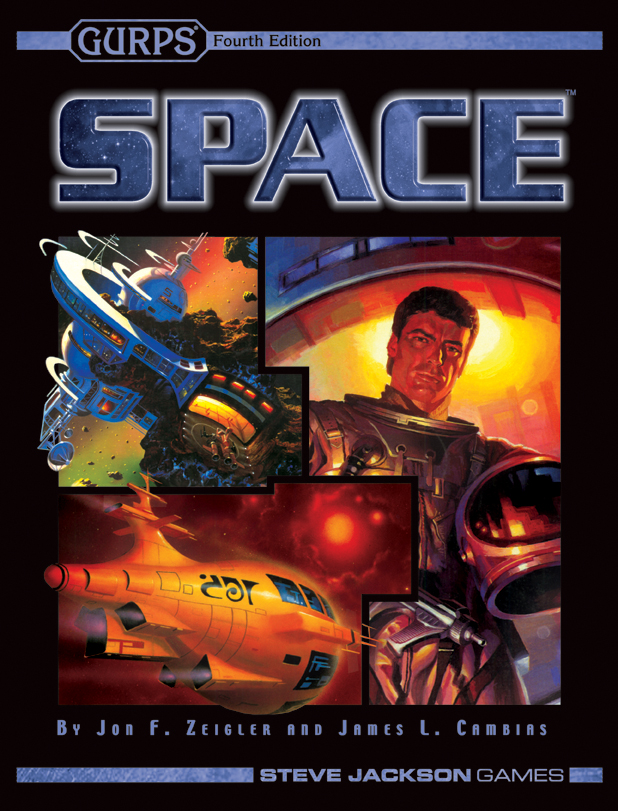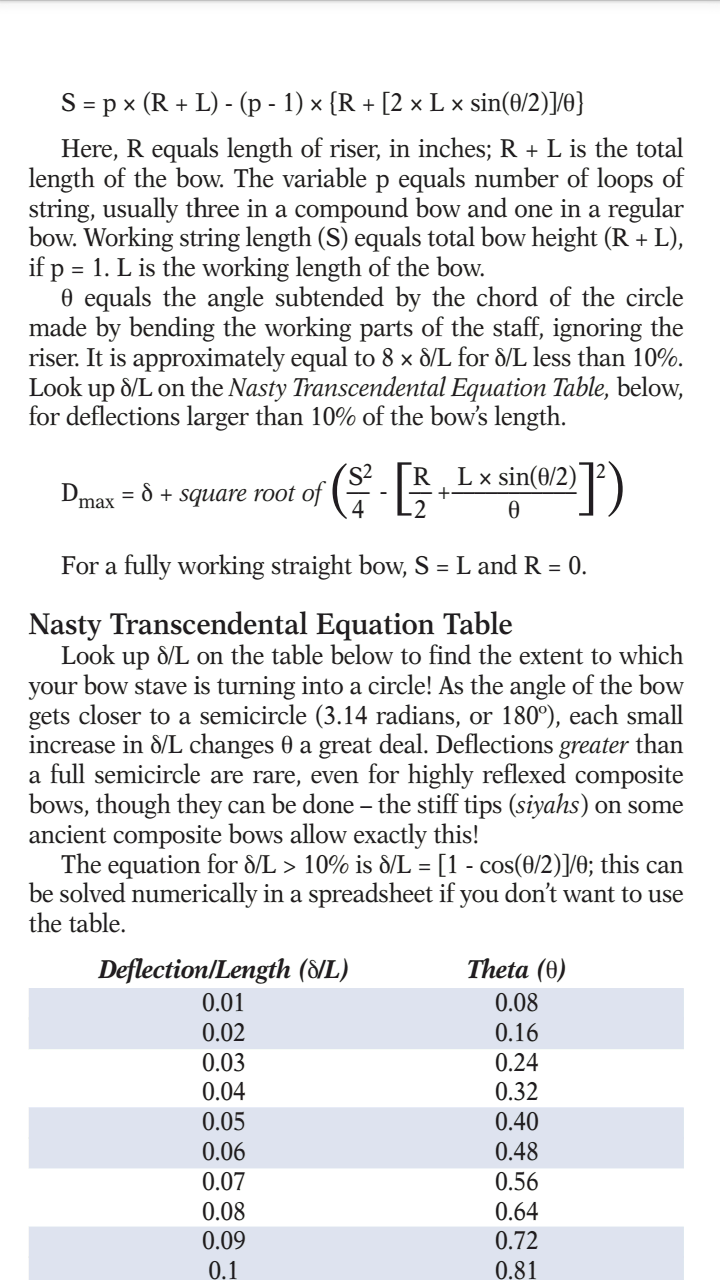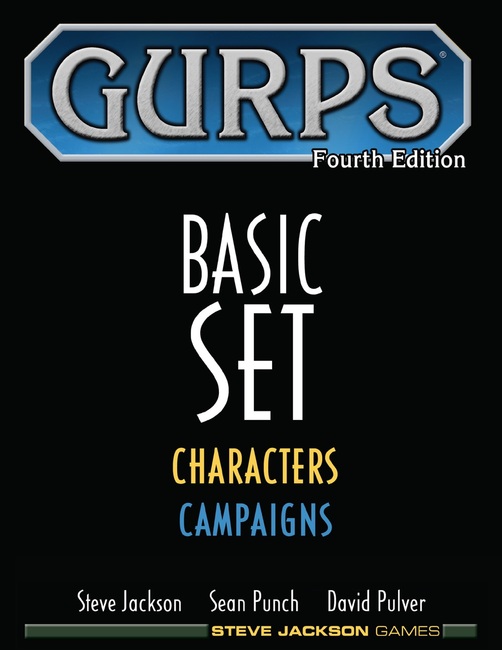Burrito King’s Guide to GURPS
Guest Post
My name is Nathan, I use the handle “Burrito King” on Discord, and I’m an addict.
I’m addicted to new games. A lot of GMs seem to have that problem. Every new, shiny thing that I see, I want. Good art? Got to have it. New mechanics? Got to have it. Historically relevant? Got to have it.
It was a problem. No, it still is a problem. I’m still searching for the “perfect” system. The one that, when I play it, every problem in my day-to-day life goes away and I’m finally just happy. I think a lot of people are looking for that. Like some kind of True Love in a storybook, they want the heavens to part and the game to force them to have a good time.
GURPS, for me, is like a stable friendship. It’s not monogamous; I can play around with other systems, and there’s no need to be jealous. But at the same time, I didn’t have a long “honeymoon phase” where I thought it was the solution to all my problems. It only solves one problem, and it’s the big one: It’s stable, and it’s there for me, and whatever I want out of a game, I can make that happen with GURPS.
I’ve played in two games, the very first of which I’ll address below. The other was a Fantasy game, with low points, and was the GM’s first time running in English, which was pretty interesting.
I’ve run four campaigns, and frankly, many of those were failures for exactly the same reason that many of my games were failures when I found myself in a bad enough place to turn to GURPS in the first place. Twice, I’ve tried to run a Space campaign that fell apart because my home group just doesn’t view gaming as a priority. Once, I set up a sci-fi game using Ultra-Lite over play-by-post, which fell apart after the entire group realized before we’d even begun character creation that they didn’t really have the time.
Right now I’m running a Weird War 2 campaign, which has been going on since February, and still going now that it’s the brink of July, even though in the back of my mind I’d kind of expected it to last a month. The party just keeps coming up with new plans, and things haven’t hit the fan yet, so they’re still going strong.
My Introduction to GURPS
I started off not playing GURPS for the exact same reasons everyone else doesn’t. I heard it was bad, too complicated, too much math, etc. I don’t like complicated; I’m good at arithmetic but don’t like it; and I certainly don’t want to play something bad. My friend’s GM was a player in a GURPS game, and said that was a lot of fun, so to take a break from their long-running 5th EditionD&Dcampaign, we decided to try GURPS with the GM’s recommendation. I asked him what he liked about it, and he couldn’t articulate it. But I’ll try anything once, so I tried GURPS.
It was awful. All these points, and no guidance on how to spend them. We were playing Superheroes, so I had… 350 points? And he gave no advice on how to build powers except to “use the Powers book.” I understand how this happened and I’m not mad at the guy – but it was miserable.

With my character created as the group had been instructed, a headache, and a general sense of confusion, I go in on the following Sunday, and… nobody else made their characters. So I’m sitting there with nothing to do for four hours while the rest of my group smokes weed and drinks beer and makes characters and I sit there sober and headach-y and missing my wife and then-3-month-old son, and it sucks. Big time.
The next week, the GM threw me a bone, and even though we were really in a social scene, he let me pick a fight, so we’d see what it was like. I had more dice in damage than your average gunshot, if I landed a hit. I almost died to a competent but altogether non-superhuman martial artist, because I couldn’t hit a thing! I totally misspent my points and had set myself up for failure.
So you know what I did next? I went online, and I asked GURPS players, who always seem so enthusiastic, why they like this frustrating game. I didn’t intend to pick a fight, but I basically did. I told them I played it, and it sucked, and it had a bad reputation. Didn’t they know all this stuff was awful?
I probably came off pretty abrasive, but I kept trying to reiterate, I want to understand. I want to feel about anything the way that GURPS players seem to feel about GURPS. And they talked, and I listened. Then I argued, and asked for clarification, and made an ass of myself until finally they convinced me of two things: first, that I’d really been thrown into the very very deep end without the help I probably should’ve gotten, and second, that it didn’t have to be that way.
I said I’d run Savage Worlds and liked that, because it was easy to run without any prep. I like talking with friends, getting into trouble and hijinks. I don’t like figuring out stats. They told me that you could do the same thing in GURPS. “How?” I asked. And they said that average is 10.
Below average is 9, above average is 12. Terrible is 6, great is 15. Don’t bother with other numbers when you’re GMing, and don’t write down anything you’re not going to use.
Then came the kicker: They suggested that I try to think of a game that I couldn’t run in anything else. Now I had just run, a few months ago, a one-shot of Trail of Cthulhu when I only had two of my usual players show up one week. They liked it, and I liked it, and we had a lot of fun for about two hours. This was a recent game, when I was having these GURPS arguments. And with that, a thought entered my head.
What if you had a campaign where there were, like, no stakes at all? Just let players be players, which means “let them be petty and stupid and then at the end look smart and cool.” I thought, “What if we were playing Pride and Prejudice meets GUMSHOE?”
So with this idea in the back of my mind I suggested that would be a game that would be hard to run in some other system. I laid the concept out. And they were like “See? There you go. Now you’d want to read Social Engineering, and maybe Mysteries, and other than that just use Lite and don’t sweat it too much.”
Then I read GURPS Space, got inspired, and came up with a whole campaign idea I was terribly proud of, ran character creation, got players excited, and ran one session. Everyone had fun, everyone was excited, and then they blew me off for another three weeks, and I was sick of it, and threw my hands up.

So I hated GURPS because I tried it, and I love GURPS because I tried it. Because I’ve been looking for a system that will just give me what I want, for years, and it just does what I tell it to. If I want cinematic swashbuckling, it does that. If I want characters who’ll die in a ditch if they get into a single fight, it does that. If I want fantasy, it does that. If I want sci-fi, it does that. If I want fantasy on a spaceship, it does that. If I want regency-era girls trying to get a man by solving the “mystery” of what that tramp Elizabeth is doing with the muscular stable-boy behind the barn, it does that.
The Elephant In The Room
There’s a misrepresentation I want to get out of the way now: the math. You’re going to need to be able to add and subtract, there’s no getting around it. You’ll likely need to be able to do percentages of 10. If this is a hassle, use a calculator, or better yet, use the excellent GURPS Character Sheet app to keep track of the numbers for you. But I don’t think that most people are really going to be crying foul for having to say, “10 plus 50” or “40, -20%.” I think they’re afraid of this:

And who can blame them? I’m not even reading it and my head is starting to hurt. I studied three years of Calculus. I can do this math. Most of it is just plugging in numbers to a calculator, anyways. But this isn’t something that’s “fun” for me. And you know a secret? That’s not in GURPS Lite. It’s not in the GURPS Fourth Edition Basic Set. It’s not in a previous edition, either: the font is far too clean.
No, this is from an article in Pyramid, the GURPS magazine, Volume 3, Issue 33. It’s for when you’re GMing, and you’re not happy with the two bows presented in GURPS Lite, or the four bows presented in the Basic Set, or the six bows presented in Low-Tech. You need a special bow, and this matters to you so much that you’re willing to do a bunch of math to change out a ST requirement of 11 for one of 13, and add +1 damage to the weapon, and you can’t bear to just “wing it.”
How to Get Started with GURPS
-
Don’t read the Basic Set.
-
DON’T READ THE BASIC SET. The Basic Set is a reference text first and foremost. It’s not a text designed to explain the rules to you, or teach you. Why would someone do this? The answer lies in understanding the situation in 2003, the year before 4th Edition came out. GURPS 3rd Edition Basic did teach you. It was less than ideal for many reasons I won’t get into, but it was a book written to introduce a player relatively smoothly to the system. The Compendiums added options and made it more generic, but they didn’t sell as well (most players didn’t need them, after all), and so they went in and out of publication, as digital and print on demand hadn’t taken off the way they have in recent years. So when 4th Edition was released, they combined everything! Nothing to go out of print! But when you design a system as a reference text that assumes familiarity with the system, you’re setting new players up for a hard time.
-
Read GURPS Lite. It’s available for free from the Steve Jackson Games website, and is going to cover 70% of your use cases. Two-thirds of the remaining cases are going to be covered by genre-specific splatbooks.
How to read GURPS Lite
Before you open the PDF, come up with a game concept and a character concept. This can be very simple; don’t feel like you need to do something complex here. The only important thing is that you want something relatively grounded in realism. More fantastical concepts can work in GURPS, but typically will rely on magic or niche options.
As you go through the book, anything that’s not relevant to your game or character, you should only skim. Read headlines, read bold text, maybe read text around it to make sense of it. If you’re confused, go back and reference the beginning of the section to see if there’s any clarification. If there isn’t, ask someone. There are active GURPS communities on nearly every social media platform, and a very helpful bunch of folks at the Steve Jackson Games website forums, who can try to answer your questions.
Build your character as you go. For the sake of this example, you’ve got 100 points, and up to an additional 25 points from Disadvantages. When you buy a Disadvantage, think about why it’s part of your character. This should be important to you.
Have that character fight a generic Thug using the combat rules in the book. The generic thug has the following stats:
10 HP
1d6 damage
Thug!–12
Dodge—8
Parry—9
If any roll is relevant to “being a thug,” including attacking, but not including defending, roll Thug!. Otherwise, roll against a 5. Don’t bother with HT rolls for the Thug. He always fails. Once he hits 0HP, he’s down. Try again until you have tried all of the combat options and you’re comfortable with what they do and how to use them. Combat will start slow, and it’s only going to improve if you become familiar with the system. The same slow-downs happen in D&D, too, when your group hasn’t been playing it for years.
A Word About the Basic Set
You can get by without it, especially if you want a low-crunch game. However, if you want things like grappling rules, vehicle rules (but not vehicle creation rules), and the like, or a more complete skills list, longer list of advantages and disadvantages, then basic is going to do you there.

If you’re planning on GMing, in particular, the Basic Set is pretty indispensable. But I recommend trying to get by without it while you can, and then consider just getting it in PDF unless you like having it on your shelf. It’s a reference text and like most reference texts, a searchable and well indexed PDF is hard to beat.
Other books fall into a few categories. Some are really important, others only useful if you see an immediate use for them. Don’t feel like even the most important ones are necessary, though, because they’re not.
Genre books (Dungeon Fantasy, Fantasy, Space, Action, Monster Hunters, After the End) are almost always good. Some are better than others of course. Space is, in my opinion, the best. It’s one of the best gaming books I’ve ever read, for any system, and is useful even if you’re not planning on ever playing GURPS. Dungeon Fantasy is the current darling, and getting a lot of the publisher support. Action is widely recommended because deep down, a lot of players kind of wish they were playing as John McClane.
Setting books (Banestorm, Infinite Worlds, Transhuman Space, and several others) are only useful if they pique your interest as a setting. GURPSis a toolbox for building any game you want. I can only speak for myself, but I can’t see the logic in saying that you want it to be completely custom, and then using something right off the shelf.
Rules supplements (Martial Arts, Thaumatology, Gun-Fu) are specifically used to add crunch, or give options on how to replace the Basic Set crunch with some other kind. None outright subtract crunch, though some try to improve efficiency by taking the same rules and giving advice on how to selectively ignore them (Action 2 in particular).
The two most useful books are Action 2 and Powers. Action 2 is a rules supplement for running the game faster, and is great. It also includes other rules, which are not faster, but help in dealing with how to run an action-movie style adventure.
Powers is for building more complex advantages. It sounds like a superpowers thing, and they certainly address that, but it’s almost entirely “here’s more options to tweak your advantages.”
It’s important to remember that you don’t necessarily get what you pay for.More books isn’t more better.
Final Thoughts
I think the best thing to remember about GURPS is that it’s a toolkit, and it’s a toolkit you can strip back to almost nothing. There’s a saying that goes around in every GURPS circle I’ve run in: “Just roll 3d6.” There are other rules, but most of them aren’t hard and fast. And given that I’ve heard someone make a less than totally compelling argument that d10+5 could work nearly as well, even that rule could be dropped in a pinch.
Whatever you want, GURPS has the tools to implement it. Someone probably has already done most of the work for you. It’s a very DIY sort of community, and I really love that. Every campaign is a thousand decisions someone had to make to get you to a game that was what they chose. It’s a labor of love, and you can see that in the way that people who enjoy it react. It’s something they love, and they just want to share that love with the world.
And it’s somewhat ironic that I say all that, and try to explain how to make it work, and to be honest, I think it would be irresponsible of me not to warn readers that it’s not exactly all sunshine and roses. The hardest parts of the game are all the parts you do first. First, you find out about this tiny, niche game. Then you read this dense, dry text, and you do the work to care. You do the work to create your campaign. You do the work to create your character. And if you’re brand new to the system, you have no context for any of this. It’s almost as if they want you to fail!
I encourage you to reach out. Learn from people who know how to run the game. Get help making characters for those games. Play, and learn. And if you find out that it’s not the game for you? That’s okay. We’re all just searching for something that makes us happy, and all I can offer you is something that doesn’t make me unhappy. But sometimes, being happy is about what you bring to the table, not what the game brings, don’t you think?
Whatever makes you happy, GURPS can help you play a game about it. What more could you ask for?
This post came into being because of a discussion in the Mud & Blood Discord. If you’ve never checked out the Mud & Blood, give it a listen. Liam and Matt cover all sorts of juicy topics and their episodes are thoughtful and well-produced.
For overview info about GURPS and links to reviews, check the game page here.
Ω